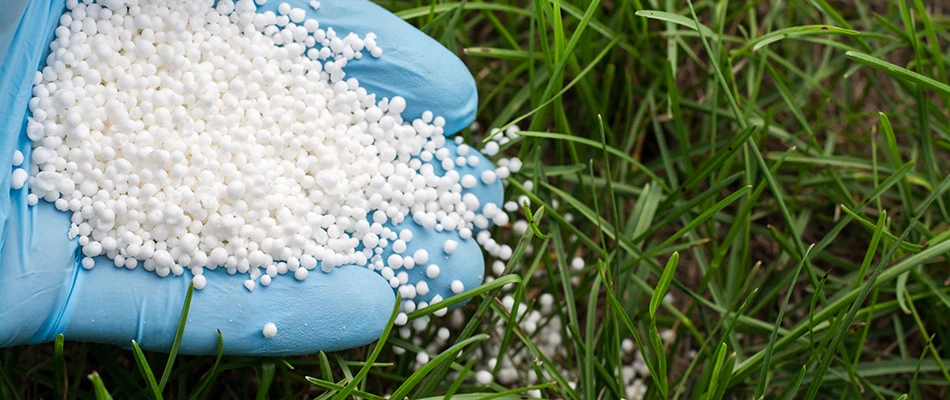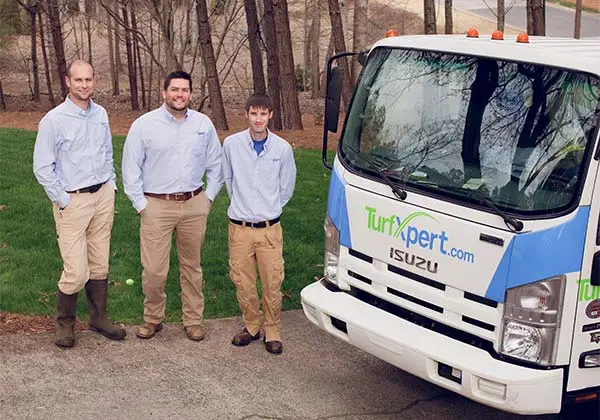
There is a lot to know about using fertilizer in northern Georgia. Does my lawn really need it? How much should I use? When should I apply it? If you've been searching for answers, look no further. This blog answers key questions about the importance and intricacies of fertilization so that property owners in Woodstock, Roswell, Alpharetta, GA, and surrounding areas will be able to make the best decisions for their lawn.
Why do I need to fertilize my lawn?
Fertilizer is incredibly important to your lawn's overall health. It provides your grass with needed nutrients to stay strong, green, and healthy, while helping it combat natural threats, such as weeds, disease, and drought. Think of fertilizer as a critical vitamin for your lawn's immune system.
What is in fertilizer?
Most fertilizer contains three key nutrients — nitrogen, phosphorous, and potassium — that work together to bolster your lawn's health and appearance. Together, these three nutrients are commonly referred to by the acronym NPK. Each nutrient plays a specific role in helping your grass thrive.
- Nitrogen enriches the green color of your grass by stimulating photosynthesis, in addition to promoting growth.
- Phosphorous enhances the strength and depth of your lawn's root system, allowing it to grow densely and healthily.
- Potassium increases your lawn's ability to withstand temperature changes, drought, disease, and pests, boosting its overall resiliency.
Does the type of grass I have matter?
Yes, the type of grass you have matters greatly because different grass strains require different fertilization treatments. In northern Georgia, there are warm-season grasses and cool-season grasses. Bermuda and zoysia are the most common warm-season grasses in our area, while fescue is the most common cool-season grass. Warm-season and cool-season grasses thrive at different times of the year and need varying amounts of nutrients depending on the season. Following a carefully designed fertilization schedule ensures your lawn will be at its best throughout the entire year.
How often should my lawn be fertilized?
The frequency of fertilization depends on the type of grass you have. Warm-season grasses are fertilized three times per year, in the spring, summer, and early fall. The first application occurs between April and June, the second between June and August, and the third between August and October. Cool-season grass is fertilized seven times per year, beginning in the early spring and ending in the late fall following the schedule below:
- Round 1: March-April
- Round 2: March-April
- Round 3: April-June
- Round 4: June-August
- Round 5: August-October
- Round 6: October-November
- Round 7: November-December
Can't I just do it myself?
Yes, you could fertilize your lawn yourself, but you need to be extremely careful. Fertilization is a science that requires precision to avoid costly consequences. You can hurt your grass by using the wrong fertilizer, too much fertilizer, or applying it at an improper time. While overfertilizing can burn your lawn and even damage the environment if it enters water sources, underfertilizng does not have the intended effect on your lawn, leaving you stripped of time and money. Lawn care professionals understand the soil conditions and often test to ensure they are using the correct proportion of ingredients. That is vital if you want to maximize the impact of fertilization on your grass.

It is best to trust a professional lawn care company to fertilize your lawn because of the complexity involved.
When should I water after fertilization?
You should water your lawn within 24 hours of fertilization, but be careful not to overwater it. Using too much water could interfere with absorption and rinse away the fertilizer before it fully penetrates the soil and root system.
How long does it take to see the effects of fertilization?
You will be able to see the effects of fertilization shortly after application, although the exact timing depends on the form of fertilizer. Liquid fertilizer absorbs directly into the soil, improving grass color and strength within 1 to 2 days. Granular fertilizer takes longer to absorb and typically begins to make a visual impact within 2 to 5 days. Both types of fertilizer benefit your lawn tremendously.
Let us fertilize your lawn!
At TurfXpert, we specialize in fertilization and other important lawn care services for commercial, HOA, and residential properties. If you live in Woodstock, Roswell, Alpharetta, GA, or nearby areas, we would love to help you help your lawn. Give us a call today at (833) 444-8873 for more information. We can't wait to connect!



Comments (0)
Thanks for your comment!
Thanks for your feedback! Your comments have been successfully submitted! Please note, all comments require admin approval prior to display.
Error submitting comment!
There is a problem with your comment, please see below and try again.